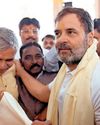
₹11,11,111 CRORE. Earmarked for infrastructure projects, this assumedly auspicious number in this year's budget does have a nice ring to it.
Another expected figure, however, was surprisingly missing-the $4 trillion mark that India's GDP is set to cross this year.
What is not surprising was the absence of the usual hyperbole.
Walking the tightrope between political expediency and long-term 'Amrit Kaal' goals, Finance Minister Nirmala Sitharaman had bigger shrimps (considering their regular appearance in her budget speeches) to fry.
TWO BIRDS WITH ONE STONE
While the political need of keeping the two main coalition partners, from Andhra Pradesh and Bihar, well-fed and happy was taken care of with an unabashed, almost embarrassing, largesse, a bigger issue remained— an economic boom that is not creating enough jobs and seemed to be benefitting only those at the top of the pyramid the pyramid. Sitharaman’s remedy? A two pronged approach of pushing for skilling, education loans and job creation while doubling down on domestic manufacturing and wooing investment. The jobs push has a central outlay of ₹2 lakh crore over a period of five years and it would benefit 4.1crore youth. It includes not just schemes for skilling the young and providing education loans, but an ‘employment linked incentive’, which will pay ₹15,000 to new employees. The aim is to coax entrepreneurs and corporates to offer jobs, and also get more private sector professionals registered in the Employees Provident Fund Office (EPFO), by taking care of a portion of their contribution to the EPFO for a period.
Denne historien er fra August 04, 2024-utgaven av THE WEEK India.
Start din 7-dagers gratis prøveperiode på Magzter GOLD for å få tilgang til tusenvis av utvalgte premiumhistorier og 9000+ magasiner og aviser.
Allerede abonnent ? Logg på
Denne historien er fra August 04, 2024-utgaven av THE WEEK India.
Start din 7-dagers gratis prøveperiode på Magzter GOLD for å få tilgang til tusenvis av utvalgte premiumhistorier og 9000+ magasiner og aviser.
Allerede abonnent? Logg på

Use multi-asset investing to overcome portfolio volatility
EQUITY MARKETS have been choppy during this year. After rallying for the better part of the first nine months of 2024, equities corrected sharply in October and November, before taking off once again on rally mode in December.

Twist of faith
Upamanyu Chatterjee is back with his wry sense of humour in his new novel, and most of it is directed at religion and spirituality

THE GLORY OF SARI
Saris of Memory weaves together history and textiles, highlighting key moments from the author's collection

We win together
We invented chess, which was pretty cool of us. The original game 'chaturanga'that is four divisions (infantry, cavalry, elephantry and chariotry)-was a war strategy game. When the game travelled to the Middle East, they mangled the Sanskrit and it ended up being called 'shatranj' instead.

BEATS THAT HEAL
Music ignites the light within us, says Grammy-winner Chandrika Tandon

Older, smarter, sexier
Those who worship him regardless of where he works have continued to do so. Such is the power of Alessandro Michele, that after being the face of some mega brands for 10 years (namely Gucci and now Valentino), he remains bigger than the labels themselves. His debut collection for Valentino was presented at the recent Paris Haute Couture Week, and it has been adored by his adorers.

The road to peace
Future political dialogues should explore means of ensuring a more robust autonomy to tribal communities

Diary of a Sherpa
Amitabh Kant's new book is a comprehensive account of the G20 Summit held in Delhi in 2023

The annoying orange
Everything is great. All is sunshine. I am an eternal optimist.\" It's the fad of our TikTok times everything is not great, the sun sets daily, nothing is eternal. If anything, everything is ephemeral, night brings darkness, and optimism often crumbles under the weight of history. British philosopher Roger Scruton warned: \"Hope untempered by the evidence of history is a dangerous asset, one that threatens not only those who embrace it, but all those within range of their illusions.\"

NO SEAT, YET UPBEAT
The Congress is buoyed by its increased vote share in Delhi, and feels it can push the AAP into further decline